Home Tags Posts tagged with "bailout"
bailout
European Commission President Jose Manuel Barroso is heading to Athens for talks on Thursday amid concern over whether Greece has done enough to get its next tranche of bailout loans.
It is his first visit for three years and he is expected to say the EU wants Greece to stay in the eurozone.
But there will be tough talking behind the scenes, analysts say.
Greece’s international lenders are also in Athens in an attempt to get deficit cutting measures “back on track”.
After months of political deadlock and two general elections earlier this year, Greece is struggling to meet the economic targets it has accepted as a condition of its bailouts.

Jose Manuel Barroso is heading to Athens for talks on Thursday amid concern over whether Greece has done enough to get its next tranche of bailout loans
Inspectors from the EU and the IMF are trying to work out whether or not Greece has done enough to receive its next tranche of loan money.
The European Commission says the country’s financing needs will be met in August, but a decision on further payments will have to be made in early September.
Without sufficient progress, it may not receive the final part of its bailout worth 31.5 billion Euros ($38 billion).
Earlier in the week, Prime Minister Antonis Samaras said Greece would suffer a much deeper recession than thought this year.
He expects the economy to shrink by 7%, greater than the 5% forecast by the crisis-hit country’s central bank.
Antonis Samaras said Greece would not return to growth until 2014.
He is expected to ask for more time to repay its loans.
Jose Manuel Barroso’s visit is overdue as Greeks often complain about European political leaders who spend plenty of time talking about them, and not much talking to them.
The Commission president is unlikely to be out and about shaking hands, but at least he will be in Athens to speak directly to the Greek people.
Jose Manuel Barroso’s spokesman said the purpose of his visit was “to meet Antonis Samaras and discuss the overall economic situation in Europe and in particular in Greece”.
He said it was “a regular meeting” and that the preparation for the talks had been “under discussion for some time”.
Fears that other Spanish regions may follow Valencia in seeking a bailout from Madrid have rattled markets.
A local newspaper in Murcia, one of Spain’s smallest regions, quoted the regional government’s head as saying it would ask for funding help of up to 300 million Euros.
On Friday Valencia asked the central government for a financial lifeline.
The yield on Spain’s 10-year bond jumped to 7.4%, while the euro fell to an 11-year low against the yen.
On Friday the bond yield – which implies the interest rate the government would have to pay to borrow new money, and acts as a measure of investor confidence in Spain’s creditworthiness – was at 7.28%.

Fears that other Spanish regions may follow Valencia in seeking a bailout from Madrid have rattled markets
Many of Spain’s regions have high borrowing needs, and speculation is growing that a number of them will follow Valencia and ask formally money from Madrid at a time when the central government itself is having trouble borrowing money.
In Asian trading overnight, the euro fell to an 11-year low against the Japanese yen – which has acted as a safe haven currency since the 2008 financial crisis – amid fears that debt problems in Spain are worsening.
The euro fell to 94.37 yen, its lowest level since November 2000.
Analysts said the developments in Spain had raised fears that the eurozone debt crisis was worsening and spreading to the region’s biggest economies.
Asian stock markets also fell on Monday amid fears that the ongoing debt problems in eurozone will hurt the region’s growth.
Japan’s Nikkei 225 index fell 1.9%, South Korea’s Kospi dropped 1.8% and Australia’s ASX 200 index shed 1.7%.
The eurozone is a key market for Asian exports and there are concerns that demand from the region may decline in the near term.
At the same time, a weaker euro has also added to the woes of Asian exporters, as it makes their goods more expensive for buyers from the region.
Police in Spain have fired rubber bullets to clear demonstrators in Madrid as a day of nationwide protests against spending cuts ended in unrest.
Protesters set alight rubbish bins as riot police charged them in the city centre, near the parliament building.
Seven people were arrested and at least six injured, officials said.
Earlier, tens of thousands of people held largely peaceful protests across Spain against the latest government austerity measures.
Public sector workers crowded the streets of Madrid, Barcelona and several other cities, chanting slogans against government “robbery”.
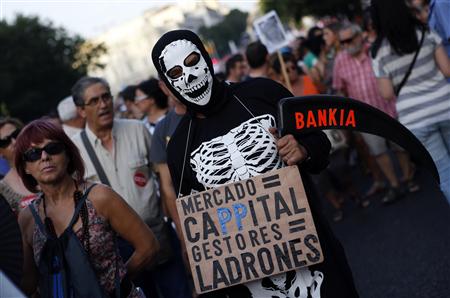
Tens of thousands of people held largely peaceful protests across Spain against the latest government austerity measures (Photo: Reuters)
Among those protesting were firefighters and police officers, as well as health and education workers.
“We have lived through bad times, but this takes the biscuit,” fireman Francisco Vaquero, 58, told the Reuters news agency.
The new 65 billion-euro ($80 billion) package of public sector wage cuts and tax rises were announced last week by Prime Minister Mariano Rajoy.
He said it was part of a deal with eurozone leaders to help rescue Spain’s troubled banks. Parliament ratified the measures on Thursday.
Earlier in the day, Germany’s parliament voted in favor of the 100 billion-euro bailout for Spain’s debt-laden banking sector.
Government austerity measures aimed at cutting Spain’s large deficit have prompted frequent protests, including one by miners against subsidy cuts last week.
At a debt auction on Thursday, Spain managed to raise 2.98 billion euros on the financial markets, but at the cost of sharply higher interest rates compared to an auction last month.
World leaders have welcomed the narrow election victory of Greece’s broadly pro-bailout New Democracy party and urged Athens to form a cabinet quickly.
The eurozone group said reforms were Greece’s “best guarantee” to overcome tough economic and social challenges.
The US stressed that it was in everyone’s interests “for Greece to remain in the euro area”.
The Syriza party, which rejected the bailout terms and came a close second, said it would lead the opposition.
With more than 99% of votes counted, interior ministry results put New Democracy on 29.7% of the vote (129 seats), Syriza on 26.9% (71) and the socialist Pasok on 12.3% (33). There are 300 seats in parliament.
Greek voters went to the polls on Sunday following May’s inconclusive elections.
New Democracy leader Antonis Samaras said Greeks had chosen to stay in the euro and called for a “national salvation government”.
Syriza’s leader Alexis Tsipras said his party would not take part in the government, and would instead become a powerful anti-austerity voice in the opposition.
The vote was watched around the world, amid fears that a Greek exit from the euro could spread contagion to other eurozone members and deepen the turmoil in the global economy.
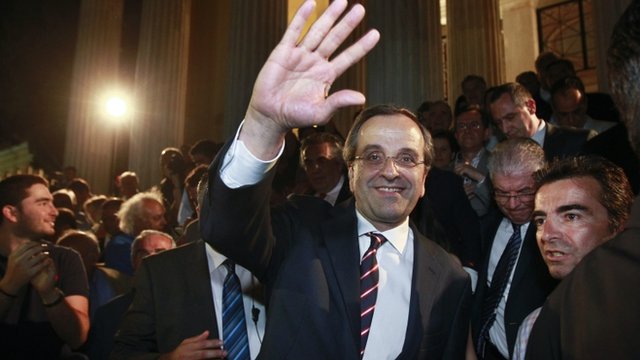
New Democracy leader Antonis Samaras said Greeks had chosen to stay in the euro and called for a "national salvation government"
Tough austerity measures were attached to the two international bailouts awarded to Greece, an initial package worth 110 billion Euros ($138 billion) in 2010, then a follow-up last year worth 130 bn euros.
Stock markets responded positively to Sunday’s results, with share prices up in Asian trading.
In a statement on behalf of the 17 eurozone finance ministers, Luxembourg Prime Minister Jean-Paul Juncker said that “continued fiscal and structural reforms are Greece’s best guarantee to overcome the current economic and social challenges and for a more prosperous future of Greece in the euro area”.
In a joint statement, European Commission President Jose Manuel Barroso and European Council President Herman Van Rompuy also hailed the result, and expressed hope that a government would be formed quickly.
German Chancellor Angela Merkel telephoned Antonis Samaras to congratulate him on his victory.
A German government statement said she had “stated that she would work on the basis that Greece will meet its European commitments”.
Antonis Samaras said that the Greek people had voted to stay in the eurozone.
“There is no time to waste,” he said.
“A national salvation government must bring economic growth and reassure Greeks the worst is over.”
He added: “There will be no more adventures. Greece’s place in Europe will not be put in doubt,” promising that Athens would “honor its obligations.”
It appears Antonis Samaras wants to press ahead with spending cuts demanded by the country’s international creditors.
European leaders have warned that if the new Greek government rejects the bailout, the country could be forced to abandon the single currency.
New Democracy should be able to build a majority coalition with the socialist Pasok, benefiting from a rule which gives the leading party 50 extra seats in the 300-seat chamber.
However, coalition talks may not be easy.
In addition to Syriza’s showing, four other parties which oppose or want a radical overhaul of the bailout look set to take between 60 and 70 seats. They include the far-right Golden Dawn, which has about 7% of the vote.
New Democracy and Pasok have said they will keep the bailout in a renegotiated form.
The leader of Pasok, Evangelos Venizelos, proposed a broad four-party coalition including New Democracy, Pasok, the Democratic Left and Syriza.
“No decision can be taken without this national unity,” he said.
[youtube 7WBPREtams0]
Spain’s borrowing costs have risen to another euro-era record, with lenders demanding a higher interest rate.
The yield on benchmark 10-year bonds hit 7% on Thursday morning, a level which many analysts believe is unsustainable in the long term.
It came as Moody’s cut Spain’s credit rating to one notch above “junk” and ahead of an Italian bond auction.
At the weekend, Spain agreed a 100 billion-euro ($126 billion) bailout of its banks by fellow eurozone countries.
It was hoped that the bailout would help calm fears in the financial markets about the strength of Spain’s banks and ease Madrid’s borrowing costs.
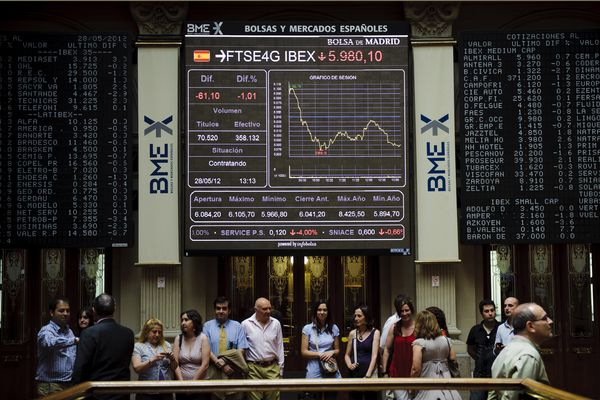
Spain's borrowing costs have risen to another euro-era record, with lenders demanding a higher interest rate
However, Moody’s said the eurozone plan to help Spain’s banks would increase the country’s debt burden.
Moody’s cut Spain’s rating from A3 to Baa3 and said it could reduce this further within the next three months.
If Spain is cut to junk, some index-tracking investors would be forced to sell the country’s bonds. This would add to upward pressure on yields and push Spain’s financing costs higher, heightening the risk that the country will need a full-blown bailout.
The difference in the rate between Spanish and safe-haven German 10-year bonds widened to a high of 5.44 percentage points.
“The risk of losing investment grade pressured the differential this morning and left it at historic highs,” analysts at Spanish brokerage Renta 4 said in a market report.
Italy will test market sentiment on Thursday with the sale of up to 4.5 billion Euros of bonds.
On Wednesday, Moody’s also cut its credit rating for Cyprus by two notches, from Ba1 to Ba3. Cypriot banks are heavily exposed to the troubled Greek banking system.
However, it is unclear whether the Cypriot government will seek a loan from its European partners or will instead turn to Russia, who already provided it with a 2.5 billion-euro loan in December.
Political change within days in Greece may mean the country has to ultimately leave the euro.
If that was to happen, how would they go about introducing a new currency?
Greek voters could this week hand power to anti-austerity parties who want to scrap the bailout, the deal that qualifies Greece for vital eurozone funds.
This would bring the country a step closer to a possible exit from the euro. So how could a new currency like the drachma be (re)introduced?
A new government would have to produce enough new notes to replace those currently in use in Greece while also doing their best to prevent a run on the banks.
It would have to be introduced over a public holiday and there would be an interim phase between currencies.
The preparations would ideally occur in secret, says Jonathan Loynes, chief European economist of Capital Economics.
“If Greece were to introduce a new currency, they would have to impose some capital controls once the change had been announced. This would mean that people would only be able to withdraw a certain amount of money from their accounts, which would be necessary to keep things orderly and avoid a run on the banks.
“Then there would be some sort of public holiday during which banks and financial markets would be closed. In an interim period before the new currency is introduced, people could pay for things electronically or with small denominations of euros until the new currency became available.”
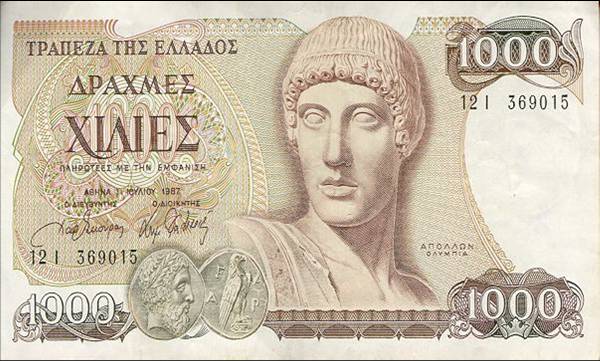
Political change within days in Greece may mean the country has to ultimately leave the euro
The new currency would then be introduced on a one-to-one exchange with the old, he says, but at some point the capital controls would be lifted and the new currency would sharply devalue.
This is what happened during Argentina’s economic crisis at the turn of the century. When the banking system came close to collapse, withdrawals were banned. The peso dropped in value, leading to high inflation, after Argentina defaulted on its public debt in 2002.
Recent reports have pointed towards English currency printer De La Rue as a possible source of new drachma banknotes.
Director of marketing for De La Rue, Rob Hutchison, will not comment on speculation that the company has drawn up a contingency plan for the production of new drachma, but he explains that the money-printing process itself can take several months.
“You have to consider the preparation of special banknote paper incorporating security features; the design of the notes; the process of bringing these elements together and then printing. It simply couldn’t be done overnight,” explains Rob Hutchison.
Economist and author of Greece’s Odious Debt, Jason Manoloupoulos, agrees: “I have heard that that the process could take anywhere between three to six months.”
So what is involved in the actual process of changing banknotes?
There is a lot to do, says Julie Girard, currency spokesperson for the Bank of Canada, which has been involved in that country’s recent transition from paper to polymer notes.
The many considerations in currency production range from the selection of the best base material and security features to the design on the notes.
“We have a team of chemists, physicists and engineers whose job it is to go out into the marketplace and see what types of security features are available, both in other currencies and through companies that produce security technology.”
These are assessed, as are different base materials to produce a cost-effective but secure note. Focus groups decide on designs and then notes are produced and distributed, says Julie Girard.
With so many cash transactions and withdrawals now taking place at ATMs and vending machines, these must be adapted to fit a new type of note.
“We spent about two years working with companies that produce machines which dispense, accept and sort paper currency, providing test notes and staff from the bank to help them. Some machines may have needed to be replaced, adapted or upgraded,” says Julie Girard.
Greece wouldn’t have the time that Canada did, but preparations may have been secretly going on for months.
Greeks have already reportedly begun to stash euros in safety deposit boxes and under mattresses.
These notes could be used to finance transactions even if another currency became the local tender, says Michael Massourakis, director of economic research for Alpha Bank, Greece.
“You can’t stop people using that money to buy things, even if you make it illegal to use foreign exchange in transactions. The euro could still be used afterwards on the black market, for example.”
But just how “new” would a new Greek currency be? Reports on Greece’s financial future concentrate on the idea of the drachma – the currency which was replaced by the euro in 2001. Could these old notes be re-used?
Although old drachma were still accepted in exchange for the euro by the Bank of Greece as recently as February 2012, most will have been shredded and burned, says the British Museum’s Thomas Hockenhull.
“If the original drachma printing plates still existed, it could be a fairly straightforward process to change the dates and use the existing machinery,” he says.
And coins may be ditched entirely. “They may just do away with coins and have only paper currency,” says Thomas Hockenhull.
“The cost of producing a coin can be more than that of making a paper note, because of the metal content.”
The Euro and stock markets have boosted in Asia after a deal to shore up Spain’s troubled banks eased concerns about a European currency break up.
In Asian trade, the euro rose 1% versus the US dollar and Japanese yen. Stock indexes in Japan and Hong Kong rose 2%.
On Saturday, eurozone ministers agreed to lend Spain up to 100 billion Euros ($125 billion) to help its banks.
Analysts said the deal would buy time for policymakers to solve other problems facing the 17-nation eurozone.
The biggest issue now looming on the horizon is the 17 June elections in Greece, and the worry that an anti-eurozone party may end up in a position of power.
“All eyes are still on Greece’s upcoming elections but investors’ worries over the eurozone have eased in the short term,” said Andy Du of Orient Futures Derivatives.
According to Stephen Davies of Javelin Wealth Management, the fact that the Spanish banking bailout was bigger than many people had expected pointed to a continuing “degree of strain within the European banking system”.

The Euro and stock markets have boosted in Asia after a deal to shore up Spain's troubled banks eased concerns about a European currency break up
“It reflects the fairly dire straits within which Europe continues to find itself,” he added.
Spain’s weakest banks were left with billions of Euros of bad loans following the collapse of a property boom and the recession that followed.
Currently Spain is in its second recession in three years and the economy is expected to shrink by 1.7% this year.
Its economic problems have become so acute, and its borrowing costs in the international markets so high, that there have been concerns that the government would not be able to service its debts.
At the same time, there were fears that some of its banks would not be able to find enough capital to continue to operate.
The exact amount of emergency funding that Spain will receive will be decided after two audits of its banks are completed within the next few days.
Spain’s loan was welcomed by the International Monetary Fund (IMF) as well as the US and Japan.
Spanish Prime Minister Mariano Rajoy hailed the decision as a victory for the single currency.
European Union economic affairs commissioner Olli Rehn said the deal was a clear signal to the markets that the euro area was ready to take decisive action to calm markets and contain contagion.
Spain is the eurozone’s fourth-biggest economy – twice the size combined of those of Greece, Ireland and Portugal, the countries bailed out so far.
However, tensions over the euro remain high with another election to be held in Greece next weekend.
If voters elect a government that refuses to abide by the terms of the country’s bailout deal, Athens faces a possible exit from the bloc.
Analysts said that in the days leading up to the election it was likely that a low-risk appetite from investors would return.
There are fears that a Greek exit could trigger a run on the banks, not only there but in other eurozone countries.
Greece has been in recession for five years, crippled by huge debts, high unemployment and labor unrest.
Spain’s decision to request a loan of up to 100 billion Euros ($125 billion) from eurozone funds to help shore up its struggling banks has won broad support.
The International Monetary Fund (IMF) said the bailout was big enough to restore credibility to Spain’s banks.
Washington welcomed the measure as a vital step towards the “financial union” of the eurozone.
The move was agreed during emergency talks between eurozone finance ministers on Saturday.
IMF managing director Christine Lagarde said the plan for Spain should provide “assurance that the financing needs of Spain’s banking system will be fully met”.
“I strongly welcome the statement by the Eurogroup, which complements the measures taken by the Spanish authorities in recent weeks to strengthen the banking system,” she said.
“The IMF stands ready, at the invitation of the Eurogroup members, to support the implementation and monitoring of this financial assistance through regular reporting.”

Spain's decision to request a loan of up to 100 billion Euros ($125 billion) from eurozone funds to help shore up its struggling banks has won broad support
US Treasury Secretary Timothy Geithner welcomed the latest moves as “important for the health of Spain’s economy and as concrete steps on the path to financial union, which is vital to the resilience of the euro area”.
France’s Finance Minister Pierre Moscovici said the deal would “contribute to restoring confidence in the eurozone”.
The president of the European Commission, Jose Manuel Barroso, said he was confident that through bank restructuring and other reforms, Spain could gradually regain the confidence of investors and create the conditions needed for sustainable growth and job creation.
Earlier, Spanish Economy Minister Luis de Guindos announced that his country would shortly make a formal request for assistance.
Luis de Guindos said the help would be for the financial system, not the economy as a whole.
“This is not a rescue,” he said.
He also said the aid would not come with new austerity measures attached to the economy. Spain has already imposed strict economic reforms in a bid to tackle its debt problems.
The loan will bolster Spain’s weakest banks, left with billions of Euros worth of bad loans following the collapse of a property boom and the recession that followed.
Some banks borrowed large amounts on the international markets to lend to developers and homebuyers, a riskier strategy than funding it with deposits from savings.
The exact amount that Spain will receive will be decided after the completion of two audits of its banks, due to be completed by the end of June.
The money will come from two funds created to help eurozone members in financial distress – the European Financial Stability Facility (EFSF) and the European Stability Mechanism (ESM), which enters into force next month.
Investors have recently demanded higher and higher costs to lend to Spain, making it too expensive for the country to borrow the money needed for a bank rescue from the markets.
Eurozone finance ministers are to hold a conference call to discuss a bailout for Spanish banks.
EU sources say Madrid could formally request financial assistance for its troubled banks this weekend.
So far Spain has denied reports that an announcement on a European rescue plan for its banks is close.
The International Monetary Fund (IMF) is estimating that Spain’s banks need a cash injection of at least 40 billion Euros ($50 billion).
The IMF said on Friday that a “stress test” showed Spain’s financial sector was well managed but “vulnerable”.
The eurozone finance ministers’ conference call is expected early on Saturday afternoon.
In an interview on Portuguese radio, European Central Bank Vice-President Vitor Constancio said: “It is expected that Spain will formulate a request for aid exclusively for banks recapitalization.
“There has to be an expression of will to have such a programme for Spanish banks, and one may hope it happens rather swiftly.”
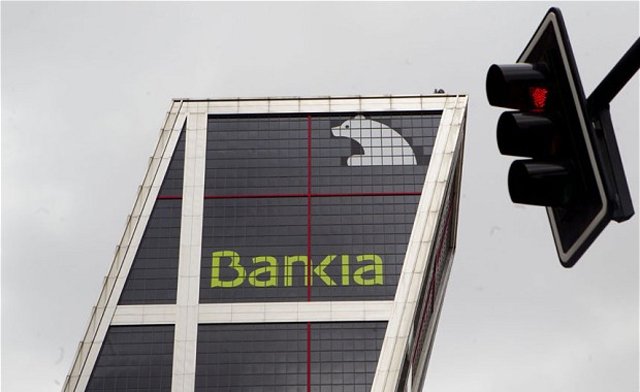
Eurozone finance ministers are to hold a conference call to discuss a bailout for Spanish banks
Spain is under pressure from Brussels to act, possibly before the feared uncertainty that could follow next weekend’s Greek elections.
However on Saturday morning, the Spanish government restated its position that it does not need outside help to shore up its banks.
“There has been no change,” a spokeswoman from the economy ministry in Madrid told AFP news agency.
Spanish Prime Minister Prime Minister Mariano Rajoy has insisted that any decision will come after the results of an independent audit on the Spanish banking system, which are due out within two weeks.
The audit will produce a figure of how much money, in total, is needed to prop-up Spain’s banks.
A rescue deal would see money passed first to the Spanish government and then to the troubled banks.
Because Madrid has already announced tough financial reforms it is likely that a deal would only carry limited conditions, our correspondent says, unlike the full-blown bailouts for Greece, Portugal and Ireland.
Reuters reported that eurozone deputy finance ministers would first hold a conference call on Saturday morning to discuss a Spanish request for aid.
The Eurogroup of finance ministers would then discuss the issue on another conference call, the news agency said, citing unnamed EU and German officials.
A downgrade of Spain’s creditworthiness by rating agency Fitch earlier this week has been seen by some as adding to the urgency of shoring up Spain’s finances.
European leaders have to make difficult decisions to steer the eurozone away from crisis, US President Obama said on Friday.
He said the US would support Europe as it implemented the hard solutions needed to solve the ongoing debt crisis.
He said a deep new recession in Europe would have an impact on the US economy.
Greece’s future in the eurozone was a matter for the Greek people, he said, but “further hardship” must be expected if the country chose to leave the euro.
Greeks will go to the polls on 17 June to try and end a political impasse that eurozone leaders say is harming Greece’s ability to tackle its economic crisis.
Spain’s economy minister Luis de Guindos has dampened speculation that the country is about to seek a bailout of its bank sector.
Luis de Guindos said no decision would be made until audits of the banks were completed, possibly by the end of June.
There have been reports in the past few days that Spain was seeking an immediate bailout from eurozone funds.
Luis de Guindos was speaking in Brussels, where plans have been published that aim to ensure that taxpayers do not have to fund future bailouts of banks.
An IMF audit of Spain’s banks is due next week, with further independent reports completed about two weeks after, Luis de Guindos said.
“I have absolutely not discussed any intervention in Spain’s banks today,” he told reporters on the sidelines of meetings in Brussels.
Asked if Spain was preparing a request for EU aid, Luis de Guindos said: “We are not preparing anything… we have a road map.”
With investors demanding higher returns to lend money to Spain, its finance minister said the credit markets were “effectively shut” to Spain, inflaming worries that the country would be forced to join Greece, Portugal and Ireland and seek outside help.
Spain has to find at least 80 billion Euros ($100 billion) to strengthen its banks’ capital buffers.
A key test will come on Thursday, with Spain due to auction up to 2 billion Euros of bonds.
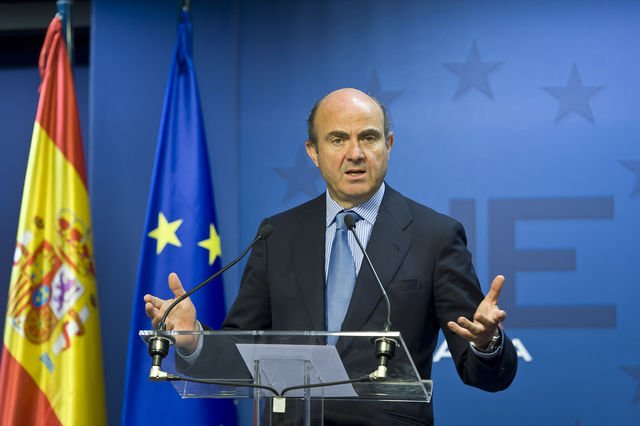
Spain's economy minister Luis de Guindos has dampened speculation that the country is about to seek a bailout of its bank sector
Spain is keen to avoid having to ask for a European Union bailout as this would come with strict conditions.
It is instead seeking funds which could be injected directly into the banking system.
Reports suggesting EU officials are looking at how this could happen contributed to a rally on European markets late in the afternoon.
UK Prime Minister David Cameron and US President Barack Obama kept up pressure on European leaders, calling for an “immediate plan” to restore confidence, after the two men spoken on the telephone last night.
David Cameron is due to meet German Chancellor Angela Merkel on Thursday to discuss the issues.
The European Central Bank (ECB) appeared unlikely to take any immediate action to provide further financial support, despite president Mario Draghi acknowledging the seriousness of the eurozone’s crisis.
After the ECB left interest rates unchanged at 1% on Wednesday, Mario Draghi suggested that further monetary policy was not the answer.
The ECB has provided 1 trillion Euros for the banking system with two re-financing operations, or LTROs, designed to ease borrowing costs.
Despite signs that borrowing costs are once again rising sharply, Mario Draghi said: “The issue now is whether these LTROs would actually be effective. Some of these problems in the euro area have nothing to do with monetary policy… and I don’t think it would be right for monetary policy to fill other institutions’ lack of action.”
On Wednesday, the European Commission unveiled proposals designed to stop taxpayers’ money being used to bail out failed banks.
The aim is to ensure losses are borne by bank shareholders and creditors and minimize costs for taxpayers.
However, new legislation is unlikely to come into force before 2014 at the earliest, too late to protect taxpayers from any further immediate bank failures.
“The proposal we have today may be only useful for the future but it does not solve the current problems we face,” said Sharon Bowles, chair of the European Parliament’s economic and finance committee.
There would be new requirements for countries to prepare for a bank collapse, collecting money through an annual levy on banks that would be used to provide emergency loans or guarantees.
The European Commission plans involve drawing up a EU-wide framework that would allow:
• Financial regulators to be more “intrusive” in the running of banks as firms’ stability worsens
• Forcing banks to draw up explicit “recovery” and “resolution” plans in the event of their finances deteriorating
• Countries to enforce the sale of all or a part of failed banks, overriding the rights of shareholders or creditors
• Appointment of a “special manager” at a bank to “restore its financial situation”
• Laying the foundations for an “increasingly integrated EU-level oversight of cross-border entities”
The changes form part of commitments agreed by the leaders of the G20 group of major economies in September 2009.
Michel Barnier, the commissioner who unveiled the plans, said: “We must equip public authorities so that they can deal adequately with future bank crises. Otherwise citizens will once again be left to pay the bill, while the rescued banks continue as before knowing that they will be bailed out again.”
If it wins the backing of EU countries and the European Parliament, the law would mark a step in the direction of the banking union supported by European Central Bank president Mario Draghi.
Spanish Economy Minister Luis de Guindos has dismissed talk of it seeking a bailout from the International Monetary Fund (IMF) as “senseless”.
And the IMF denied that Spain had asked to discuss rescue loans.
The IMF has contributed to bailouts of all the other eurozone nations, such as Greece, that needed help.
Meanwhile, the European Central Bank (ECB) president Mario Draghi described the current set-up of the eurozone as “unsustainable”.
There were rumors that Spain had already gone to the IMF, after the Spanish deputy prime minister went to meet the IMF’s managing director Christine Lagarde.

Spanish Economy Minister Luis de Guindos has dismissed talk of it seeking a bailout from the IMF as senseless
“My desire is to not come out and deny these rumours because they are senseless,” Spanish Economy Minister Luis de Guindos said on Spanish television.
Spain has taken Greece’s place as the epicentre of the eurozone crisis as concerns over the health of Spanish banks have shaken markets.
Bankia, Spain’s fourth largest bank, has asked for another 19 billion Euros recently from Madrid, but many question whether Spain will be able to afford it.
Speaking to the European Parliament, Mario Draghi said: “Can the ECB fill the vacuum of lack of action by national governments on fiscal growth? The answer is no. Can the ECB fill the vacuum of the lack of action by national governments on the structural problem. The answer is no.
“The next step… is to clarify what is the vision a certain number of years from now. The sooner this is specified, the better it is.”
And EU economics commissioner Olli Rehn said more austerity was needed if the eurozone was to avoid disintegration.
Olli Rehn talked down the idea of European states issuing joint bonds, saying that austerity and closer co-operation were needed.
“We need a genuine stability culture and a much upgraded common capacity to contain common contagion,” he told a conference.
New figures also showed eurozone inflation slowed more than expected this month.
Inflation in the 17 countries that use the euro eased to 2.4% in May from 2.6% in April.
The figure is still above the ECB’s target to keep inflation below 2%, but the lower-than-expected number could fuel calls for an interest rate cut next week.
In other figures released on Thursday, Germany’s unemployment rate fell below 7% as Europe’s biggest economy continued to perform strongly.
The jobless rate dropped to 6.7% in May, from 7% in April, as the number of people unemployed fell by 108,000 to 2.86 million.
However, there was more bad news from Greece as figures showed that Greek retail sales volumes fell by 16.2% in March compared with a year earlier. This followed February’s decline of 12.9%.
Trading in shares in Bankia, Spain’s fourth-largest bank, has been suspended in Madrid.
Bankia asked them to be suspended ahead of a board meeting this afternoon to reformulate its accounts for 2011 and submit a plan to shore up its finances.
The bank is reported to be due to ask the government for a bailout of more than 15 billion Euros ($19 billion).
Bankia, which is Spain’s fourth-largest bank, was part-nationalized two weeks ago because of its problems with bad property debt.
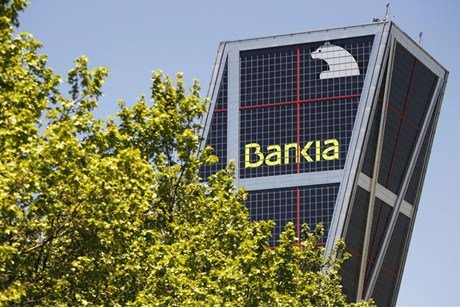
Bankia, which is Spain's fourth-largest bank, was part-nationalized two weeks ago because of its problems with bad property debt
Any extra government money would be on top of the 4.5 billion Euros in state loans that the government converted into shares in the group in the part-nationalization process.
Shares in Bankia’s parent company Banco Financiero y de Ahorros (BFA) have also been suspended.
Bankia had to reassure its savers last week that their money was safe after a Spanish newspaper reported a run on the bank.
Bankia was created in 2010 from the merger of seven struggling regional savings banks. It holds 32 billion Euros in distressed property assets.
Spain’s economy minister Luis de Guindos said on Wednesday that the government would pump at least 9 billion Euros into Bankia but that more would be available if it was needed.
There have been four attempts by Spanish governments to shore up the banking system since the global banking crisis of 2008.
As part of the latest plan, lenders are having to make 30 billion Euros of extra provisions to cover potential losses on property loans, which comes on top of 54 billion Euros they were ordered to set aside in February.
The health of Spain’s banking system is key to whether the country eventually needs to seek a bailout itself from the eurozone and the International Monetary Fund.
But Professor Santiago Carbo Valverde of the University of Grenada, said he thinks Spain’s other large banks are not in as difficult a situation as Bankia.
“Bankia has huge exposure to real estate and bad loans, much larger than other banks.
“Other banks may have trouble as the government is demanding more capital, but I don’t think we will have another big case like Bankia.
“The three largest ones are in better shape as they have lower exposure to bad loans and they are more internationally diversified.”
Spain’s credit rating was downgraded by Standard & Poor’s last month on the basis that it would probably have to take on more debt to support its banks.
Its shares fell 7.4% on Thursday to close at 1.57 Euros, which is 58% down from their listing price in July 2011.
Bankia history
• Formed in December 2010 from merger of seven troubled banks
• Most toxic assets moved into holding company BFA
• Listed on the Madrid stock exchange in July 2011
• Chairman Rodrigo Rato resigned earlier in the month before Bankia was part-nationalized
Greece has set the new election date on 17 June and a judge has been appointed to head an interim government.
Council of State president Panagiotis Pikramenos will head the caretaker government until the election.
The election date was announced after party leaders met Greek President Karolos Papoulias on Wednesday.
Final talks to form a coalition failed on Tuesday, raising new concerns over Greece’s eurozone future. No party won a majority in the 6 May election.
There has been deadlock since the election over whether to continue with the austerity measures required by an international bailout agreement.
The uncertainty pushed the euro to a new four-month low against the dollar.
EU officials fear Greece will elect an anti-bailout government, which could trigger a Greek exit from the euro. That possibility is now discussed openly among Europe’s leaders.
But a senior adviser to European Council President Herman Van Rompuy played down that possibility on Wednesday.

Greece has set the new election date on 17 June and a judge has been appointed to head an interim government
On Wednesday the eurozone crisis pushed Asian stocks lower and knocked oil prices.
Tokyo’s Nikkei index dropped 1%, while Hong Kong’s Hang Seng and South Korea’s KOSPI lost about 3%.
The euro fell more than half a cent to $1.27.
Meanwhile the borrowing costs for Spain and Italy rose again, with Spanish bond yields hitting 6.5% and Italy’s 6.1%.
The uncertainty over the euro has also sparked concern over a run on the banks in Greece.
Greek newspapers report that around 700 million Euros ($897 million) has been withdrawn from high street banks over the past few days.
People are concerned that an exit from the eurozone and a reversion to the drachma would wipe out much of their savings, he says.
European leaders say they will cut off funding for Greece if it rejects the bailout agreed in March.
This would mean effective bankruptcy for Greece and its all but certain exit from the euro, analysts say.
German Finance Minister Wolfgang Schaeuble stressed again on Wednesday that there would be no new discussions on Greece’s bailout.
The head of the International Monetary Fund, Christine Lagarde, has raised the possibility of orchestrating an “orderly exit” for Greece from the eurozone.
“It is something that would be extremely expensive and would pose great risks, but it is part of options that we must technically consider,” she said on Tuesday.
After talks in Berlin with German Chancellor Angela Merkel following his inauguration as French president, Francois Hollande said he wanted Greece to remain in the euro.
Opinion polls suggest Greece’s leftist Syriza bloc, which came second in the 6 May vote and rejects all further cutbacks, could become the largest party after a new election.
Syriza wants to renegotiate the bailout package but also wants to keep Greece in the euro.
Pasok and New Democracy, which signed up to the bailouts and had previously dominated Greek politics for decades, saw their combined share of the vote drop from about 77% to about 33% on 6 May.
On Tuesday, Greece said it would make a “timely payment” on 435 million Euros’ worth of debt due on 15 May.
 Prev123Page 3 of 3
Prev123Page 3 of 3













